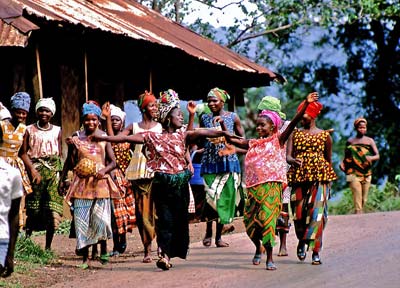Source: WordPress
Women's groups in Sierra Leone are robustly pushing the government to establish laws to increase the representation of women in public life. And young women are joining in, too.
 Vickie Remoe, a young women's activist, who describes herself as a "warrior queen," argues on her blog that increasing the role of women will "sow the seeds of socio-cultural change," which will benefit women and, by extension, the whole country.
Vickie Remoe, a young women's activist, who describes herself as a "warrior queen," argues on her blog that increasing the role of women will "sow the seeds of socio-cultural change," which will benefit women and, by extension, the whole country.
Although Sierra Leone is trying hard to improve, it is a developing country where, amongst other considerations, poverty is rife. For women, in a country where male dominance is widespread and entrenched, unsurprisingly the inequalities they face are more severe. Life expectancy for women is about 40 years. In the West the average is closer to 80.
Women face poor access to education and health facilities as well as discrimination in the job market. Beating by men as well as sexual harassment and rape account for some of the other problems women face. And indeed this is shameful.
In 2007, the government of Sierra Leone passed laws to protect the rights of women. The laws covered areas of domestic violence, registration of customary marriage and divorce, and devolution of estates. And it seems likely that parliament will pass a law to force political parties to increase the opportunities for women. Progress is being made when women take a strong stand.
These are steps in the right direction in improving the lives of women. In spite of these strides, however, more still needs to be done to give women equal access to economic opportunities, education, health facilities, social freedom and more of a role in public life.
"With a population of 51 percent women in the country, a minimum 30 percent quota means that [there will be] more opportunities for more women," said Remoe. This begs the question, which women will benefit more?
While it now seems that the priority for women's campaign and advocacy groups is on the 30 percent quota, one wonders if this is in line with the priorities for the rural women. The latter may have pressing basic needs including better sanitary facilities, access to clean water and education. Arguably, these do not seem to be the priority of the women in the forefront of the equality campaign.
Female Genital Mutilation (FGM), carried out by women, is a highly controversial practice. The practice inflicts permanent pain and harm to women. According to Amnesty International, 90 percent of the adult female population in the country has undergone this practice. This figure is, however, contested by other human right groups suggesting the true figure is about 65 percent. Many rights organizations have called for the banning of FGM. Many young women, if not all, are opposed to FGM. However, women's groups have fallen short of calling for a total ban.
Another problem for the women's struggle is the appearance of being vulnerable and less capable than men. The fact that women are pushing for "quotas" could portray them as coming from a position of weakness. The weakest ones face the risk of being manipulated by powerful and selfish men.
Equally, the anti-male attitudes of some women's campaigners, who often portray men as the problem or even "the enemy," present another problem for the women's struggle. For example, women in certain quarters are implying that Sierra Leone had not progressed over the last 50 years because all the leaders were men. It is not uncommon to hear the sentiment, "Why don't they allow women to run the country and see how we progress?"
Unsurprisingly, some analysts have argued that the bringing up of children is what women do best and that it's better for society to operate that way. However, history has clearly shown us that women have contributed more to our society than just bringing up children.
Women's immense contribution to Sierra Leone's development is significant to our country's history—from Madam Yoko, who had great power and influence during colonial rule in the late 19th century, to women who challenged military regimes and fought for peace. The presence of Madam Ella Koblo Gulama in Sierra Leone's first post-independence cabinet has not led to the sort of advancement that her appointment appeared to herald.
At the height of the civil war, women organized what was believed to be the largest march across Sierra Leone, calling for peace. They succeeded in getting the rebels and the government to listen. The women's brave action resulted in the historic signing of the 1999 Lomé Peace Accord. More than a decade on, peace and stability continue to prevail.
The role of women in every aspect of our country's socio-economic development is highly necessary, including the increased advocacy role they play.
Sierra Leonean women and girls have the right to fight for equal opportunities. This is not only good for our women but good for our country's development, too. As the saying goes, "Behind every successful man, there's a woman." So too, one could argue that behind every successful nation, there's unity and equality between men and women.
Unisa Dizo-Conteh is the president of Young Leaders-Sierra Leone (www.ylsl.org), an organization that promotes youth empowerment and participation in nation building. His organization has been a key partner in celebrations to mark Sierra Leone's 50th independence anniversary in London this year. The organization supports gender equality.
